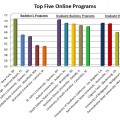 Audit, tax and advisory firm KPMG recently released results from its 2013 Higher Education Outlook Survey.
Audit, tax and advisory firm KPMG recently released results from its 2013 Higher Education Outlook Survey.
The survey, now in its second year, questioned 103 senior officers in higher education – 62 of whom came from private institutions, and 41 from public schools. KPMG conducted the poll in May and June 2013.
When asked what top changes institutions were making in response to recent educational marketplace trends, the results show a majority of those polled will focus on technology and alternative methods of delivery.
In the information from KPMG announcing the release of the survey results, Milford McGuirt, KPMG’s National Audit Sector Leader for Higher Education & Not-for-Profits, stated that education leaders are thinking about how to maintain quality while also taking action to make a college education more affordable.
Fifty nine percent, compared with 41% the previous year, said they are focusing more on new methods, such as online education, to help tackle challenges such as cost, quality and access to education.
“There is a clear recognition of the importance of exploring alternative methods for educational delivery, but to date very few not-for-profit colleges and universities have radically changed their business model,” David Gagnon, a KPMG Audit partner, said in the announcement.
Gagnon said that based on KPMG research, the schools that best strike a balance between offering online and on-campus experiences will be most successful.
While the survey results expressed a considerable increase for both private and public institutions offering online access to education, public institution leaders expressed more commitment to the idea (66% vs. 45% in 2012 for public; 55% vs. 35% in 2012 for private).
“Private institutions are concerned about their brand and there is a perception that online courses may dilute the small, liberal arts classroom experience,” said McGuirt. He added that public schools might be more open to offering online courses because they are under a mandate to make education more broadly available to students while also facing increasingly worse financial pressures.
When questioned about actions taken or deliberated as a result of federal and state funding cuts, 51% of respondents answered raising tuition. Thirty-six percent said more online courses are being offered as a consequence of cuts, while another 36% said they are postponing capital projects.
Gagnon pointed out that the federal government has told public colleges and universities that they cannot keep raising tuition to handle financial problems, but that many continue to do so as long as they can maintain enrollment.
He said, however, that fewer schools will be able to pull this off as financial pressures increase, the need to change the educational delivery model intensifies and universities work harder to demonstrate that attaining a college degree is worth the financial sacrifice.
“As families continue to struggle with rising tuition costs, higher education leaders must find new methods for delivering quality education more cost-effectively,” Gagnon said in the KPMG announcement.





